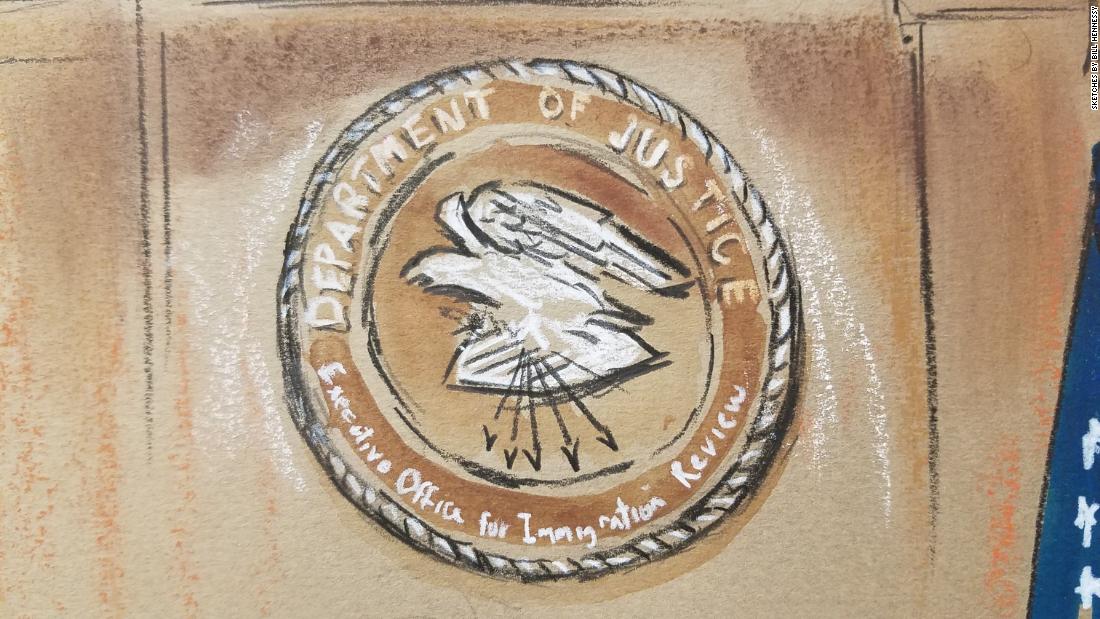
Judge Ashley Tabaddor, the president of the National Association of Immigration Judges, described judges in Los Angeles coming back this week to boxes filled to the rim with mail that had piled up over the course of the 35-day shutdown.
"Everybody did the best they could," Tabaddor said. "It's just a lot of trying to work with our hands tied behind our back."
The government shutdown centered on Trump's immigration agenda. His $5.7 billion request for his signature wall along the US-Mexico border, and congressional Democrats' refusal to give him that money, brought the government to a grinding halt -- including immigration courts.
Trump has repeatedly criticized the nation's immigration system, specifically taking issue with the practice of releasing immigrants while they await their court date. To remedy that, his administration has sought to hire more immigration judges in the hopes of unclogging the court. Even so, the shutdown seems to have put those efforts behind.
The only cases that moved forward during the shutdown were those of immigrants in detention. All others were postponed. Syracuse University's Transactional Records Access Clearinghouse, which tracks immigration court data, estimated that more than 42,000 immigration court hearings had been canceled as a result of the shutdown -- exacerbating an issue Trump pledged to resolve.
"What this does is it adds greater delay to the cases. We were shortchanged five or four weeks of time," Tabaddor told CNN. "Not only were we not able to hear cases that were previously cases that were scheduled, but it's going to take time to regroup."
Executive Office for Immigration Review spokeswoman Kathryn Mattingly said in a statement that "non-detained immigration cases that were continued due to the partial government shutdown will be rescheduled to the earliest available hearing date on the immigration judge's calendar."
EOIR, which is within the Justice Department, warned the American Immigration Lawyers Association last Friday that there might be "some confusion" as non-detained courts reopened.
Jeremy McKinney, an immigration lawyer in North Carolina and treasurer of AILA, confirmed that there was some confusion Monday, but otherwise business continued as usual as cases already scheduled for the week proceeded. The issue, though, is all the cases that preceded those this week and had to be postponed.
An immigration judge described the situation to McKinney as a highway that's "cleared a massive wreck but you have to deal with all the damage from the accident," he said, the damage being the pile-up of cases. McKinney had about a dozen cases canceled as a result of the shutdown.
In Los Angeles, Tabaddor explained situations in which court filings hadn't been processed so cases scheduled for this week couldn't move forward. The lack of interpreters, some of whom are contracted and need to be provided advanced notice, also required some cases be postponed, she said.
The immigration courts are no strangers to case pile-ups. For years, the number of pending cases has been slowly creeping up, as more cases are added to the docket that can be addressed at any given time. Immigrants fighting deportation generally have a chance to make their case in court, where they can ask a judge to allow them to stay in the US by arguing they qualify for asylum or another legal option.
According to TRAC, there are more than 800,000 cases pending. That often results in cases being scheduled years out.
The Trump administration has tried to expedite the process by creating a quota system. Under former Attorney General Jeff Sessions, the Justice Department took the unprecedented step of implementing a quota system that required judges to clear at least 700 cases a year to receive a "satisfactory" performance evaluation. Between 2011 and 2016, judges completed 678 cases a year on average.
In some cases, these changes have led to judges expediting their retirement. "There's definitely an uptick of judges who are retiring," Tabaddor said. "Over and over again, we've been hearing from our colleagues that are retirement eligible that they're tired of the way they're being treated." Not only does that mean less judges, but less experienced judges, she added.
There are 409 immigration judges nationwide. "EOIR is currently authorized 484 immigration judge positions and is actively working to reach that goal," Mattingly said in a statement, adding that "it is not unusual to see an increase in government retirements at the end of a calendar year."
For now, the looming question is when cases postponed during the shutdown will be rescheduled.
Bagikan Berita Ini














0 Response to "The government shutdown took its toll on the nation's immigration courts"
Post a Comment